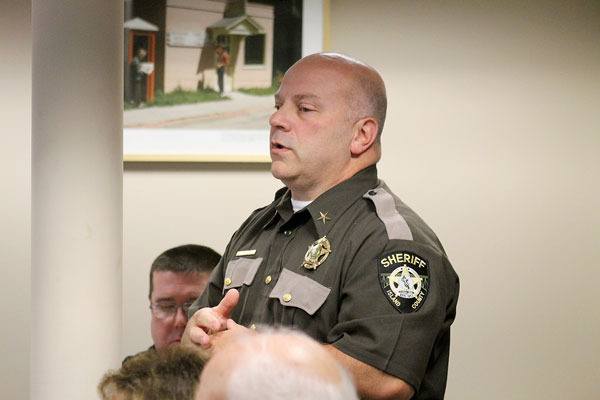Langley’s parks will remain hourless for the time being, the city council decided Monday.
The parks’ hours of operation may also remain unchanged until 2017 if the council opts to take the advice of the Langley Parks and Open Space Commission, which recommended the council table the issue for half a year until further examination of increased patrol activity and cleanup efforts of heroin syringes found around Seawall Park are made.
“The proposal is to revisit the issue in six months to see if increased, intense patrol and intense litter cleanup are sufficient to deal with problems there,” said Marianne Edain, co-founder of Whidbey Environmental Action Network and member of the commission.
The council also heard testimony from two homeless people who frequent Langley, as well as hearing healthy debate between the city’s police chief and community members both for and against the closure of city parks at nighttime.
At a Sept. 5 council meeting, Police Chief David Marks recommended the city council close parks in Langley at night after finding 40 syringes in two weeks at Seawall Park. The exact time in which parks would be closed is still being determined; it could either be between dusk and dawn or from 12 a.m. to 6 a.m.
Though the council has not decided whether parks will be closed, council members moved that the city install lighting in areas prone to drug activity, as well as talk with nearby property owners to help make the area less prone to illegal usage.
Marks remained resolute that Seawall Park be closed at night to help prevent drug usage and the discarding of used needles. If the city does not act, it is liable if someone steps on them, he said. He said he was against closing it between dusk and dawn due to season changes.
He added that park hours are necessary so that he and officers have more flexibility in approaching people at the park who may be up to no good. Without hours, their hands are tied, he said.
“There’s nothing reasonably suspicious about being in a park that’s open,” Marks said. “It’s not suspicious at all.”
Natasha Hamlin, a homeless woman and former heroin user, said she has only seen one needle in the area and that she reported it to police. She said it wasn’t OK for people to be using drugs at the park and that she too would like to see that sort of activity gone.
“I don’t want to see them either,” Hamlin said. “I came to the island to get clean off heroin from Ohio.”
She said she’s seen more condoms than needles at the park. She also said that she and a homeless man, Wayne Martin, used to sleep underneath buildings around Seawall Park. Even if the city installed lights, she doubted it would do much to prevent people from staying there.
“The lights wouldn’t bother people like me,” Hamlin said. “We’re sleeping, so we’re not going to see them, you know?”
“It’s not going to hurt to put them up,” she added.
One man in the crowd asked Martin how long he was able to live undetected beneath the buildings.
“When did you guys see me?” Martin replied, a response that earned laughter in the council room.
He was also asked if closing the parks would do any good, to which he replied, “Probably not.”
Hamlin commended Marks for his generosity to the homeless and said that the chief is not looking for ways to arrest people.
Marks said much of the area where syringes were found is on private property. He said trails that run off residents’ property may also become closed as a result, and residents would lose access regardless, and that property owners are asking for police to do something about the issue.
“What we think of as our park, a lot of it isn’t,” Marks said. “I think that’s a reasonable request.”
Edain said the commission felt more manpower could be spent patrolling the park and will be aided with the arrival of new Langley police officer Mason Shoudy. Additionally, they encouraged building owners in the area to trim back vegetation that obstructs vision underneath or around their property.
Residents again argued back and forth between the virtues of keeping the park open and closing it, as well as the severity of evidence supporting frequent drug usage. Joyce Riley said that while there are positives in preventing drug usage, she felt it was unfair to punish the rest of the citizens to “maybe” find users.
She also doubted the patrols would do much to make the problem go away and that it inhibited the liberties of Americans.
“They’re [The homeless] just going to watch for the patrolmen to go by and then get back to it,” Joyce said. “You’re not going to run them out by denying us access to the park.”
Langley resident Wayne Carter said that he uses the parks daily, and frequently sees the needles while walking with his son and that the problem is all too common for other parents.
“This is a conversation we have on a daily basis with our children,” Carter said. “This is an epidemic. It’s a problem. We all know that. Our chief here is offering up one solution that could help. Why don’t we give it a try? I don’t want our chief and police out there every morning picking up needles; that is not safe. Why would we would we even put them in that situation when we could prevent it?”



